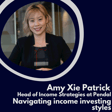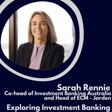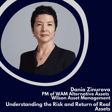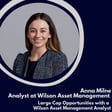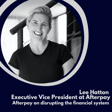Introduction and Podcast Disclaimer
00:00:03
Speaker
Welcome back to the Alpha Females Invest Podcast, two females working in the finance industry searching for alpha. My name is Clooney. And I'm Emily. And together we bring diversified perspectives from the buy and sell side of the finance world.
00:00:18
Speaker
As usual, any information discussed in this podcast is not financial advice. All opinions reflect those of the individuals and this podcast is for educational purposes only. You should always read the PDS and talk to a financial advisor who can consider your personal circumstances before you invest.
00:00:36
Speaker
Today is the second episode of a two-part series with Baron Joey.
Meet the Guests: Molly and Min from Baron Joey Capital
00:00:40
Speaker
We are joined by another two analysts, Molly Urquhart and Min Pham from Baron Joey Capital, which is a new Australian investment bank that launched in 2020 backed by Magellan and Barclays.
00:00:51
Speaker
Molly is a research analyst covering real assets, including REITs and infrastructure. Prior to Baron Joey, she covered REITs at CLSA and worked with public and private sectors on infrastructure and real estate transactions and policy as an economist at EY and the RBA. Amazing. Minh is an analyst in the bank sector, and she's spent the past five years in equity research in banks, insurance, and diversified financials.
00:01:15
Speaker
Prior to Baron Joey, she worked at UBS for seven years after joining as a cadet in operations. Thank you both so much for coming on the show today. We'll be covering what life is like as an analyst at Baron Joey, why they decided to join Baron Joey, and the key topics valuation and earnings drivers in their respective sectors. So welcome to Molly and Min. Beautiful. Thank you both for having us.
00:01:39
Speaker
Thanks for having us. We might kick off with our first question that we ask all of our guests on the show and it's usually one that I guess makes our guests a little bit more relatable and to open
Awkward Career Moments to Relate
00:01:52
Speaker
up the show. So could you please tell us about your most embarrassing career moment and perhaps we'll start with Molly. Yeah, I mean going back
00:02:02
Speaker
There have been some shockers. Min and I have had a good laugh over this question today. But having listened to your episode with Travis Miller from iPartners, I feel compelled to stand in solidarity with Travis, coming from suburban Perth, we're many years behind Sydney culturally. So moving over, I also couldn't use chopsticks.
00:02:23
Speaker
At client lunches, I would wait for opportune moments to attempt and have some food. I distinctly remember one low point where I had to impale a king prawn tempura at Matsuya with a chopstick. Even now, I'm still ineffective. I just shamelessly asked for a fork. But I'm sure there are more of us out there, so maybe this is a call out there for other people that struggle. And what about you, Min? What embarrassing moment would you like to share?
00:02:49
Speaker
Yeah, as Molly said, there's probably been many, but the one I remember most vividly was in my first six months as a research associate, we were still doing face-to-face briefings. I left the office addressed on a note for a result briefing because usually the address never changes, the office never goes. And just my luck that year, for the first time ever, the company wasn't actually holding an in-person briefing.
00:03:12
Speaker
So, the lead analyst of the stock, a couple of the clients saw in our result note that the briefing was going to be there, cab down to North Sydney, and the briefing was only going to be on the phone. So, yeah, they took it on the chin and found it pretty funny, but needless to say, I was pretty mortified at the time.
00:03:29
Speaker
There are a couple of good ones and we always do get a good embarrassing moment. Even today, Molly, I'm just gonna relate to you for a second. I did go for a sushi at lunch at a client lunch and I leaned over to pick up one of these sort of nigiri seared salmon things and the whole thing just went like splack on the table. And I was like, oh, sorry, like with my serviette trying to scrape it up. And that is after four years of avidly using chopsticks. So the embarrassing moments just keep flowing.
00:03:58
Speaker
So last episode, we asked April and Minnie why they decided to join Bar and Joey. I'd be super interested to hear both your views, given again, you both joined from the sell side. So maybe Molly turning to you first, do you just want to give us a little bit of intel there?
Motivations and Firm Culture at Baron Joey Capital
00:04:13
Speaker
Yeah, absolutely. So for me, it was the opportunity to build something from the ground up that was Aussie owned, Aussie managed. We've also had the unique opportunity to start with a blank sheet and curate a franchise and a product.
00:04:27
Speaker
that we think will best serve the needs of the Aussie market and our clients. So that was the biggest draw card. Obviously the quality of the industry leaders who are now my colleagues here at Baron Joey, that was a huge added bonus. So I think those are the two key things that brought me over.
00:04:42
Speaker
I mean, what about you? Yeah, I think I'd echo all of Molly's words. The only other thing I'd add to that is that, yeah, it really isn't every day where a full service investment firm gets started from scratch. And it's so exciting to be part of that journey. And I knew a lot from UBS and also heard a lot of the guys who are starting the business and it's just
00:05:01
Speaker
They're people that I want to work with. So it's been very exciting so far. And having joined, I think the key differentiator in terms of culture has been just how transparent senior managers are. And there's no bureaucracy. And I think that comes from being a majority staff owned firm. So it's been great.
00:05:16
Speaker
That's great. Thanks, guys. Really interesting perspectives there. Let's dive into a bit more sector specific content. So Molly, starting with you, you have quite an interesting background as an economist. Can you talk us through how that landed you in a sell side equity research role? Yeah, absolutely. I mean, I suppose at risk of sounding like a true analyst, it hasn't been a particularly linear path.
00:05:42
Speaker
I have an economics background. So yes, I went to the RBA after uni and thereafter I went to EY where I was an economist there. As you said, Emily, I worked in the infrastructure transaction space. I worked with private now, which I cover before I made the move over to the sell side research. I'd say that those different experiences have stood me in pretty good stead in my coverage of rates and infras. So they're both sectors where macroeconomics is highly relevant.
00:06:09
Speaker
as is policy and also having a good, broad, general knowledge of business and economics and the way the world works is really important in research. And the knowledge of the way the world works is really important in research.
Molly's Nonlinear Career Journey
00:06:23
Speaker
So yeah, it felt nonlinear at the time, but I'm grateful for the experiences I've had. And I think it's been a great foundation for research.
00:06:29
Speaker
That does sound like a really interesting background, Molly, and I love hearing all the different ways our speakers have gotten themselves into the industry. I think it would be a miss of me not to mention that I also think it's pretty interesting you covering REITs and infra, given both sectors have recently been pretty hot, I guess, at the backend of this year.
Why is M&A Activity High?
00:06:49
Speaker
Can you maybe talk to why you think this space has seen so much M&A recently, and are there any key industry trends you can point to?
00:06:56
Speaker
Yeah, Clinton, you're spot on. So it's been an incredibly active year in markets so far with a lot of M&A action. And yes, a lot of it has focused on hard assets. So both real estate and infra. And I'm reflecting on why this has been so I'd point to a few conditions which have really set up the perfect landscape for this tool.
00:07:17
Speaker
take place. So firstly, there's been an incredible amount of liquidity. During COVID, debt and equity markets remained open. So there was no real liquidity crunch. This saw unlisted players looking to deploy a lot of capital in a low interest environment. And it also saw listed vehicles able to raise capital from the equity markets as well.
00:07:39
Speaker
Second, I'd say Australia continues to present really good risk adjusted returns. And so there's a lot of offshore capital that is continuing to look for positioning in the Australian market.
00:07:50
Speaker
And then I think most critically, we saw a dislocation of listed and unlisted pricing for these hard assets. So vehicles had been trading below what some would argue was fundamental fair value due to the uncertainty of COVID and that disruption. But when you took a step back and looked at these assets, they often have really long dated concessions, many decades long, really high quality cashflow with certainty of indexation.
00:08:18
Speaker
And they can also be procyclical, so they're favourably positioned often to economic activity, so essentially the COVID recovery. Putting that all together, you have an incredibly attractive M&A proposition for capital, which is able to be a lot more patient than the listed markets and was able to look through that COVID uncertainty.
00:08:39
Speaker
That's a great background. Thank you for that Molly. As an ex REIT analyst very briefly in my career, I have an understanding that obviously REITs are valued quite differently to other stocks on the market. So typically you'll hear about a discount or premium to NAV or NAV, and you'll also kind of hear the word cap rates being thrown around. Can you talk us through how REIT valuation does differ to other stocks on
Understanding REIT Valuation Metrics
00:09:05
Speaker
Yeah, absolutely. So we are a bit different to your industrial stocks, given the value of REITs is essentially tied to its underlying hard asset valuations. We often refer to NAS or net asset valuation, which is your assets less your liabilities, obviously, but in the REIT world, the majority of that is your property book less the debt you have against that book.
00:09:27
Speaker
So if a rate is trading at a discount to NAV, you could argue that the market is undervaluing its hard assets based on their book value. A reason for this would be if investors think the assets are overvalued and expect negative revaluations to come through.
00:09:43
Speaker
Conversely, if a rate is trading at a premium to NAV, investors may be forecasting positive asset revaluation, or potentially back to the M&A point, there may be an M&A premium in the stock price, or there may be some intangible value that the market is appreciating in the business, like a pipeline of future development.
00:10:04
Speaker
You know, in saying all that, though, like other sectors, you can't just use one measure alone to determine whether a rate is undervalued or overvalued. We rely on both DCF and NAV to determine our fundamental valuation so that we're capturing both the cash flow and earnings growth and also the valuation of the hard assets.
00:10:23
Speaker
And I'd say this balance evaluation methodologies is becoming more important as we see rates shift to managing assets in funds with capital partners rather than holding these assets on balance sheets themselves.
00:10:38
Speaker
That's a really good explanation. And you spoke, I guess, to REITs being tied to a hard underlying asset. To delve into that a little more for our listeners, I guess, can you explain the benefits of investing in public real estate versus private?
Investing in Public Real Estate vs Private Housing
00:10:53
Speaker
Obviously, not everyone has a house deposit in this market straight away. So is investing in REITs a good way to get exposure to the Australian housing market, or is it much more than that?
00:11:04
Speaker
Yeah, I think that's a really interesting way of looking at getting RESI real estate exposure. So yes, there are rates that are exposed to the RESI market by virtue of their residential development activity. Some are more concentrated in apartments, others have exposure in large scales attached housing development.
00:11:24
Speaker
And yes, you're right, these stocks are exposed to resi cycles. So as demand and pricing shift, margins can improve or worsen on these development activities. And that definitely feeds through to earnings for these rates. The observation I would make, though, is that investing in resi via a rate developer will tend to be more cyclical than if you were to buy a residential property yourself.
00:11:48
Speaker
because these vehicles sell their stock and the underlying land off to purchases. Whereas if you were to buy a house yourself, you would reasonably expect the land value to appreciate over the long term.
00:12:04
Speaker
Yeah, that makes sense. You obviously touched on, I guess, the residential, I should say, part of rates, but there's also retail, industrial, and office categories as well. Could you maybe explain some of those differences and what determines why you like a certain sub-sector at a certain point in time?
00:12:21
Speaker
Yeah, that's right. So yes, the rate sector has many different sub sectors within it. You know, you've pointed to two big ones, their resi office, retail, there's also industrial, and there's many other different alternative exposures as well. So there's retirement, healthcare, childcare, hotels, self storage,
00:12:40
Speaker
And I would say a high level, the commonalities between these exposures are they are all hard asset exposures with underlying land values. The differences are in location, purpose, scale and the tenant covenant. So that all comes back to land values and the income stream that can be generated from the property.
00:13:02
Speaker
Different subtexts are exposed to different headwinds and tailwinds. It's well known that industrial has benefited in recent times from the tailwinds of e-commerce.
00:13:12
Speaker
demand with three PLs and retailers expanding their warehouses. Retail, on the other hand, has had the opposite impact from e-commerce. Large malls have come under considerable pressure as investors look to the future and question what role these centres will play as we increase our online shopping. I know I've given it a fair crack.
00:13:34
Speaker
And then also you can say, for office, you know, offices come under considerable pressure under COVID with questions as to whether we're going to return to the office in the same way. You know, other things like policy, government stimulus. Resi definitely benefited during COVID from government stimulus, as did childcare. So I would say there are many ways to play rates and
Impact of Rising Interest Rates on REITs and Banks
00:13:52
Speaker
each can have its own very unique exposure at any point in time.
00:13:56
Speaker
Yeah, that's really interesting. It's almost like sectors within a sector, I guess, and the fact you can get quite unique exposure in different ways, I think it's a real unique sort of element, I guess, of the landscape. So changing tact just a little bit, you know, there's obviously a lot of chatter about interest rates currently, and maybe this is a question in you too, but how do you see rising rates affecting your sectors? You know, are they impacted differently or is it the same across the board?
00:14:25
Speaker
Yes, the REITs are exposed to rates. I mean, firstly, by virtue of the gearing profiles and secondly, in DCF valuations, as all sectors are, for the REITs, generally, as risk-free rates compress, investors seek better risk-adjusted returns in real estate. And conversely, as we saw bond yields increase recently in the US, the REITs underperformed.
00:14:48
Speaker
So the key really from our point of view is to try and look through at the fundamental valuation of these assets. So taking a normalized look through position on risk free rates. And when we're looking across the real estate subsectors and the specific assets, you could reasonably expect that those assets that have the lowest risk adjusted returns will find themselves to be the most impacted by increasing interest rates.
00:15:15
Speaker
And then do you have a view on that too? Yeah, just on the banks, as Molly was saying, yeah, firstly, from a cost of capital perspective, just how you calculate a fundamental valuation for bank stock is obviously influenced by interest rates. But it's also from a margin perspective. So as interest rates rise, banks' funding costs rise, and that also flows through to rate rises for all types of banking products.
00:15:39
Speaker
So in a perfect world, banks would raise the rate of interest charged on their loans faster than the rate they pay on customer deposits, but it's likely that much of this will be competed away in the current environment. And also a key unknown for the banks in a rising rate environment is firstly the health of the economy if rate rises become too deflationary, and eventually what that would mean for loss rates.
00:16:02
Speaker
Cool. Thanks, Min. And now moving back into kind of your sector, which is one of the most significant sectors in the Australian economy, but it's also one that's quite commonly categorised as being a boring sector. Some people think that there's not much differentiation between the major banks, given that they do more or less quite a similar thing or do they? I guess what do you see as the key differentiators between the businesses in your coverage?
Strategic Approaches of Major Banks
00:16:30
Speaker
Yeah, thanks, Emily. Before I joined the team, I would have said the same thing. All of the banks look the same. It's a boring sector. But what we've seen over the past year is that the banks are actually pursuing quite different strategies. So if we just go in alphabetical order, ANZ is very strong in institutional banking, especially now that Westpac exited some of the businesses, given the Oztrack issues, we've seen ANZ really flourish in that market.
00:16:54
Speaker
For CommBank, they're shooting the lights out in retail banking and they've got a clear technological lead above the peers. You've seen them announce adding crypto to the app. So they're doing a lot to retain the retail customer. And in NAB, they've had a leading business bank for 20 years and they've been investing in that heavily over the past year and heavily in the bankers as well as simplifying the processes. And it looks like they're actually doing quite well in that. And they're quite leveraged the recovering business cycle that we're seeing now.
00:17:24
Speaker
And finally, on Westpac, that's the one that's really struggled through its Oztrack issues. But also, we've noticed that they've also had a reduction in their MFI share, which refers to the main financial institution. So basically, who do you bank with on a regular basis? We've seen Westpac really reduce in that category. And as the second largest retail bank in Australia, where at one point it was actually competing with CommBank for the top retail bank, the contrast is actually quite stark. So it'll be interesting to see how they turn their business around again. But yeah.
00:17:54
Speaker
It looks the same, but it's actually quite different. I think that is definitely a good explanation because I get very confused between the four majors. So maybe to break it down even further, obviously I think everyone understands what a bank is. But can you break down for us how a bank actually works? What are the bank's revenues? What are the expenses? And how does it really generate a profit at the end of the day?
How Do Banks Generate Profit?
00:18:20
Speaker
Yeah, thanks, Clooney. Banks are spread businesses, so they make money from lending, so mortgages, business loans, credit cards, and that gets funded through deposits, which cost them money. So put simply, the difference between the lending rates and all of the loans they have versus the cost of funding through the deposits and wholesale markets is the revenue they make.
00:18:39
Speaker
They also charge fees on certain products like you would have seen, credit cards, FX fees, merchant terminals, but the vast majority of the revenue comes from the asset yield minus the liability yield, which analysts refer to as the net interest margin, which is the NIM.
00:18:54
Speaker
Operating expenses are all the other costs you would imagine for an industrial like staff and technology. But for a bank, you also have the additional cost of credit default or a bad debt charge, which can be quite significant in years of economic recession or shock. So what we saw through the COVID pandemic was an example of that when the banks had to provision billions of dollars as they were facing months of lockdown. That depressed earnings a lot last year, but we've seen the reverse impact of that.
00:19:21
Speaker
when now excess provisions are being released and capital is being returned.
00:19:25
Speaker
That was a super clear explanation. I think that's going to be really useful for our listeners. So thank you, Mim. And it wouldn't be a conversation about the banking sector without talking about the Royal Commission that happened a couple of years ago that brought to light a whole number of different issues in the financial sector.
Issues from the Royal Commission
00:19:43
Speaker
I guess, can you go through at a basic level what some of those key issues were and have they been able to overcome these issues now that we've had a couple of years post Royal Commission?
00:19:53
Speaker
Yeah, absolutely. I don't think at the time you could go a day without reading a headline in the paper about the issues that were there. But the most shocking issue was the level of irresponsible lending that was rampant across both mortgage brokers and the internal bank staff. But there were heaps of other issues like malpractice in their wealth management business, overcharging of fees, ridiculous criteria on car loans that just nobody could claim on. So because the Royal Commission mandate was quite long, it looked back over 10 years from 2018,
00:20:23
Speaker
Some of the issues had already been addressed and it was just out in the open now, but others have been slowly addressed since. The most notable one would be the gradual sale of all of the banks' wealth management businesses and them understanding that cross-sell is probably not the best idea in front of the Royal Commission.
00:20:40
Speaker
and in terms of irresponsible lending that occurred essentially where banks didn't verify expenses and used unrealistic assumptions around household expenditure to lend more than they should. So a lot of those practices have now been phased out and the banks are using a lot better data to verify income and expenses now.
00:20:59
Speaker
What I would say is that the pandemic has meant that the banks have really been part of Team Australia and the approach the government has been using to help the economy. So, by providing loan deferrals, fee cuts to merchants, they also pass through most of the cash rate cuts in full. The public rhetoric around the banks has really changed over the past year and it's shown that they are instrumental to the health of the economy. So,
00:21:22
Speaker
I think, yeah, the Royal Commission issues are mostly behind, but at least in terms of the issues that are fundamentally and operationally wrong, and hopefully that continues.
00:21:33
Speaker
Yeah, 100%. I think you touched on a lot of the key issues there, Min, and maybe one more issue that I'd like to bring up is, you know, I feel like there has been a lot of commentary recently and sort of post the Royal Banking Commission as well around the requirement for banks to hold excess capital. Can you just explain what that means and why it's really important for these big banks to hold enough capital? And, you know, I hear of the CET1 ratio. Can you maybe just describe that and how it's measured as well?
00:22:02
Speaker
Yeah, thanks, Clooney. I'll try not to get too technical because it can get quite expensive. But bank capital is essentially the equity value of a bank, less the intangibles. It's the banks' skin in the game, essentially. The most common form of referring to capital is, as you mentioned, the CT1, our common equity T1, which is the equity minus the intangibles.
00:22:23
Speaker
The CT1 is usually measured as a ratio of the bank's eligible CT1 over the risk-weighted assets. For example, mortgages secured by Resi property are considered lower risk than unsecured credit card lending. Each lending product is given a prescribed risk-weight depending on how risky the regulator believes it to be.
00:22:45
Speaker
And so, for example, mortgages secured by resi property are considered lower risk than unsecured credit card lending. So each lending product is given a prescribed risk weight, depending on how risky the regulator perceives it to be. And that goes into the calculation for risk weighted assets. So APRA prescribes an appropriate level of capital for all of the banks, and it's important for the banks to hold excess capital above that to account for the dividend, but also just for proper business risk management, right?
00:23:12
Speaker
So the main reason banks are required to hold capital is to protect bank deposit holders. As we've seen from the GFC, it also helps the economy and the government, which is liable for deposit insurance, by establishing rules to make sure that the institutions are safely leveraged.
00:23:28
Speaker
Great, Min. Thank you. And yes, CET1 can be a deep hole. So thank you for not getting too much in the week there. I guess Molly touched on how kind of her sectors are quite cyclical and impacted very much by the macro environment. I guess, does this apply also to the banking sector and how has the very bullish residential housing market at the moment impacted the banks and how do you kind of incorporate that into how you think about your recommendations and valuations?
Banks and Housing Market Performance
00:23:57
Speaker
Yeah, I'm definitely not going to claim I have all the answers on the housing market, but maybe just a few observations that I've noticed. Housing credit growth is annualizing about 6% to 7% at the moment, and that's the highest level since the last housing boom in 2017. And household debt to income ratios are almost at 200% now. So a house in Sydney costs about $1.5 million. It's grown 20% in the past year. So it's
00:24:22
Speaker
It's pretty impressive how leveraged we are and you can't deny that the health of the economy is really closely related to housing market sentiment and performance now.
00:24:32
Speaker
So what I would say is that over the past month, we've seen steps taken to kind of remove some of the frothiness. APRA has recently changed the serviceability buffer, which goes into calculating what a bank will lend you from 2.5% to 3%. The banks have also moved fixed rates up because of increases in funding rates. And you've also seen auction clearance rates fall over the past couple of weeks as volumes have risen. So that's usually also a precursor to some slowing.
00:25:00
Speaker
In terms of how we view the banks, investor sentiment for banks is obviously influenced by the general health of the economy, which is now closely tied to the health of the housing market. So we'll see how it goes of the next year. Let's really hope you are right on that, Min, because we'd love the housing market to all slow down a bit, I'm sure. Time to get on the property ladder. Exactly.
00:25:21
Speaker
We recently did an episode with Lee Hatton, who is an executive at Afterpay.
Fintech's Influence on Traditional Banking
00:25:27
Speaker
And I think it's pretty clear there is an intent from Afterpay to really expand into traditional banking products eventually. Do you think the big banks should be weary of this competitive threat at all? And I guess why do you think the financial industry has been ripe for disruption?
00:25:42
Speaker
Yeah, I thought that was a very interesting podcast, so thanks for having her on. The banks probably didn't pay enough attention to Afterpay when it first started, and some of that has been a function of the regulatory framework that is allowed in text to flourish, and the banks wouldn't be able to release a product like Afterpay, right? They'd have to treat it as credit.
00:26:01
Speaker
They're definitely paying attention to that now with some of the banks releasing new unsecured credit products. Others have partnered with shopping platforms. Westpac has partnered with Afterpay. I think the financial industry has been quite ripe for disruption now because they've gotten so big
00:26:16
Speaker
So bureaucratic, sometimes they've just lost sight of the customer and the innovation required to attract new customers. Unfortunately, when your back book is quite profitable, you get worried about cannibalisation of existing businesses and that makes you lose sight of potential innovation that lets other players thrive. We're seeing most of them become very wary of this issue now and they're each using their own strategy to tackle this.
00:26:39
Speaker
So, we think it's likely that the financial industry will continue to see further disruption, whether in unsecured credit, FX fees, payments, maybe even other forms that we haven't even thought of yet because smaller, more nimble companies will probably slowly chip away at the banks and reduce those earnings streams over time. So, the challenge for the banks over the medium and long term is to find other ways to provide value for the customer.
00:27:04
Speaker
Thanks, Min. That's really interesting. I think we're definitely going to see more and more competition in the space and even, you know, CBA announced that it's going to be able to provide some crypto products as well. So certainly a space to keep an eye on. I guess it's been a really interesting overview for both of your sectors, Molly and Min. So thank you so much for coming on the show. We do like to end with one final question to our guests, and we've had some really great answers so far on this series.
Career Advice from Molly and Min
00:27:32
Speaker
We would love to hear about your top career tip that you've come across or that you've, I guess, used. I'm sure our listeners would love to hear it. So maybe Molly, we could kick off with you. Ooh, great question. I think my top career tip would be, look, I've never regretted taking an opportunity or having a crack. So I think it's an oldie but a goodie. So just always say, yes, you'll never regret having a try.
00:27:58
Speaker
That's great. And Min, what about you? Yeah, I think mine's probably been used a couple of times now, but honestly, I can't echo the people who've mentioned this already. It's just ask questions, be curious. I feel like nothing's a stupid question unless you've asked it maybe for the third time. So definitely better to ask a question early rather than later.
00:28:18
Speaker
I couldn't agree with both those statements more. And I think clearly, Evan and I like to ask a lot of questions, as Evan has by our podcast. And we clearly like to take a crack too. So it's good to hear that you both are really passionate about the sectors that you work in and clearly really passionate about your careers too. So thank you so much for joining us on the show today. And we really hope our listeners have enjoyed both part one and part two with Darren Joey. Beautiful. Thank you for having us. Thank you for having us. Thanks, guys.
00:28:47
Speaker
Thank you for listening to the Alpha Females Invest podcast. If you like this episode, we would love your support on Instagram. You can find us at Alpha Females Invest. You could also leave a podcast review, but most importantly, please keep listening. See you next time.





